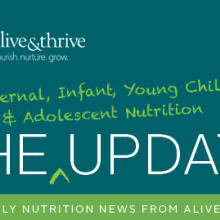Journal article
Apr 22 2021

Old Tricks, New Opportunities: How Companies Violate the International Code of Marketing of Breast-Milk Substitutes and Undermine Maternal and Child Health during the COVID-19 Pandemic (Ching, C., 2021. Int'l Journal of Environmental Research and Pub Hth)
An analysis reveals that breastmilk substitutes companies are using health claims, misinformation about breastfeeding, digital marketing, and promotional tactics such as donations and services to capitalize on families’ COVID-19 fears to undermine breastfeeding and sell products.
Journal article
Jul 16 2020

Early child growth: how do nutrition and infection interact? (Dewey, K., 2011. Maternal & Child Nutrition)
This study reviews how the interaction between nutrition and infection affects child growth in low‐income populations.
Journal article
Jul 16 2020

The challenge of meeting nutrient needs of infants and young children during the period of complementary feeding: an evolutionary perspective (Dewey, K., 2013. The Journal of Nutrition)
This paper provides an evolutionary perspective on why modern complementary food diets are often inadequate, asserting that inadequate diets and nutritional deficiencies have likely been a part of the human condition since the agricultural revolution.
Announcement
Jun 01 2020

The Maternal, Infant, Young Child & Adolescent Nutrition Update newsletter
Click below to read past editions of the MIYCAN Update is Alive & Thrive's quarterly global newsletter.
Report
Dec 31 2019

Violations du Code de commercialisation des substituts du lait maternel, Abidjan, Côte d’Ivoire
Ce rapport détaille les résultats d'une étude examinant les réalités des violations de le Code international de commercialisation des SLM (CCSLM) en Côte d’Ivoire.
Journal article
Nov 15 2019

Translating the International Code of Marketing of Breast-milk Substitutes into national measures in nine countries (Michaud-Letourneau, I., 2018. Maternal & Child Nutrition)
This paper investigates how the International Code of Marketing of Breast-milk Substitutes (the Code) was translated from an international policy framework to protect breastfeeding against inappropriate marketing practices into national level legislation, in the context of the advocacy efforts un

